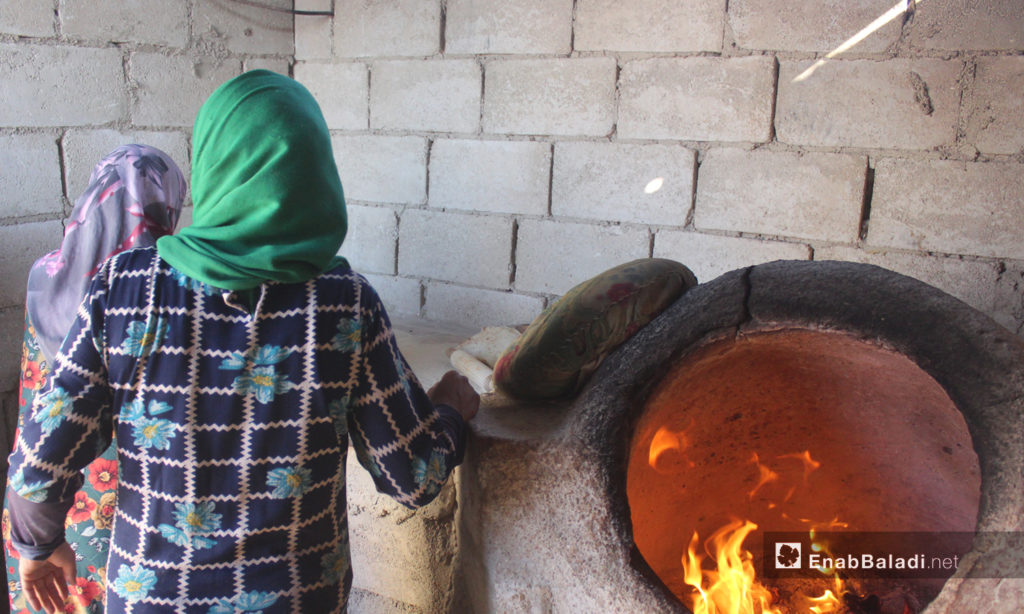Enab Baladi – Saleh Malas
“ Even though making flatbreads is so exhausting because I make it myself and sometimes with my neighbor’s help. Yet, I think homemade bread is much tastier and better than store-bought bread.”
Inside her home in the province of Rif Dimashq, Halima “aka Umm Ammar” (57 years old) has to knead the dough with her hands to make “Tandoor bread” in a traditional way, because bread is no longer available in government bakeries at all times, Halima told Enab Baladi online.
In fairly thin and large dough discs just like paper, on a tava called “Saj,” which is a flat or convex disc-shaped griddle made from metal, Halima makes flatbreads for the daily consumption of her family.
lower cost
The cost of a bundle of homemade bread is estimated at 1,700 Syrian Pounds (SYP- 0.5 USD); one kilogram of flour is sold for about 1,400 SYP (0.4 USD). On the other hand, the price of a bundle of bread in the market sometimes reaches more than 2,000 SYP, according to Halima.
In late October, the Syrian regime’s Ministry of Internal Trade and Consumer Protection raised the price of subsidized bread and flour in its area of control by up to 100 percent.
The ministry’s decision stated, “The sale price of one kilogram of subsidized bread without a bag is modified to become 75 SYP (0.02 USD) when sold to the consumer. The price of a plastic bread bag is set at 100 SYP (0.03 USD) for bread distributors and consumers from the bakery outlet.”
The decision included raising the sale price of a ton of subsidized flour to 40,000 SYP (13.8 USD).
The increase in the price of a bundle of subsidized bread came in conjunction with the crisis of the SYP’s devaluation against foreign currencies. The US dollar is worth around 2,600 SYP during the current November, according to the website of Syrian Pound Today (a Syrian Pound tracking website.)
A shortage of flour in bakeries … “Let’s bake at our homes”
The majority of the city’s residents in Rif Dimashq mainly rely on buying bread from the market. However, just a few weeks ago, long breadlines re-appeared in front of bakeries in the Syrian capital, Damascus.
Because of the disruption of bakeries in Rif Dimashq, people have to go to the capital to buy their bread.
Sometimes people go to the bakeries for nearly three days. Still, they cannot even buy one bundle, according to what Halima quoted about people’s suffering while securing a bundle of bread from the bakeries.
Halima said that she heard that the neighbors started to use the flour they have at their homes in making saj bread due to the shortage of flour in state-owned bakeries. She added, “As long as we know bread baking, so why don’t we bake it at our homes?!”
On 15 September, the Director-General of the Syrian Bakeries Foundation, Ziad Hazza, announced that the bread situation was “improving,” denying that there was a shortage of flour and baking ingredients such as yeast, and fuel, despite the bread crisis that appeared in the form of long queues in front of bakeries in Damascus. He said that all bakeries are well provided with bread supplies to meet people’s demands, and “fair distribution is taking place despite economic sanctions,” according to the pro-government newspaper, al-Watan.
“ Making and baking saj bread ” is one of women’s old profession in the Syrian countryside. The smell of freshly baked bread attracts everyone and evokes happy memories. When Halima was 18 years old, she learned under her mother’s supervision to prepare this type of bread at home. Now she is using this skill after many years as a shelter to protect her and her family from the bread crisis that most Syrian cities are experiencing.
Homemade saj bread was a luxury in the past but at present, it is a necessity
The bread crisis has brought the saj bread baking skill to the front of the daily household chores in Syria again. Many Syrian people prefer to bake their own bread instead of standing in long lines outside bakeries to buy bread. They think that homemade bread is less expensive and much healthier than bakery-bought bread. This is how Amal Sallat “Umm Ibrahim” (44 years old) compared homemade bread and market-bought bread in a phonecall with Enab Baladi. She said that baking bread is like going “on a picnic” where all family members were gathering and cooperating with kneading and baking bread before the 2011 year.
Making “saj bread” takes so much time and effort, especially if the number of people for whom the bread is made is large, according to Sallat, who has been practicing this profession for a long time. It also needs special tools such as “a bread cushion;” the sheeted dough discs are then placed onto the oven’s inner walls with the aid of the cushion. Besides, the rolling pin is used to flatten the dough in addition to a gas cylinder.
“Saj bread” had symbolism in the city of Idlib, represented in gathering relatives and friends on various occasions such as wedding ceremonies and funerals. Those gatherings used to create a feeling of heightened security among people during family crises,” Sallat said. Nowadays, saj making bread has become a necessity more than a luxury, due to bread crises and high prices.

